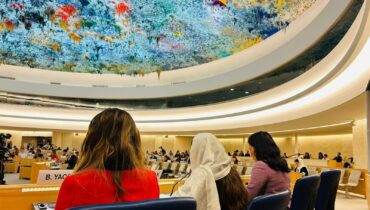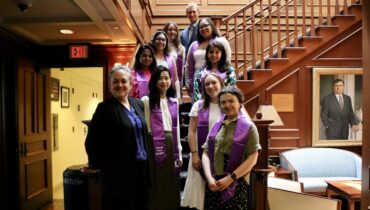Hey Hoyas! Are you looking for Spring 2021 courses with a gender focus? Georgetown University offers a wide range of courses that examine the intersection of gender with war, history, politics, law, immigration, religion, and sustainability.
I really enjoyed the Gender, Environment and Sustainability course with Patricia Biermayr-Jenzano. We looked at case studies of how gender norms and environmental issues play out in Latin America, and I focused on Indigenous women as environmental activists in the Amazon for my final project. It sparked my interest in the linkages between climate change and gender, which I’m now exploring in my role as a GIWPS research assistant.
The following list includes both graduate and undergraduate course offerings for Spring 2021 that incorporate a gender analysis. Click through the course numbers to access the course descriptions and schedule on MyAccess.
Graduate Courses
The following 3 courses have been approved for credit towards the GIWPS Graduate Certificate in Gender, Peace and Security. Students who are not currently pursuing the Certificate are also welcome to enroll!
Gender, International Security and Development – GOVT 570 or MSFS 571
Professor: GIWPS Affiliate Researcher Dr. S. Ayse Kadayifci-Orellana
Time: Mondays 5-7:30pm
This course aims to prepare students to work as diplomats, experts in peacebuilding, development, humanitarian relief, displacement, and post-conflict reconstruction, among other fields, with a knowledge of gender issues and the ability to apply a gender lens. The class contextualizes gender issues and asks the question: how would we think about international peace, security and development approaches and design intervention strategies if gender was treated as a central consideration in international affairs and peacebuilding programming? To answer this question, the class will explore both conceptual considerations related to gender and its practical application. Focusing on practical skills such as conflict-sensitive gender analysis, it will examine how to most effectively mainstream gender into policy making and programming related to international peace, security, and development. This is a mandatory, core course for the GIWPS graduate certificate. Certificate candidates are required to complete this foundation course.
Diversity & Inclusion in Conflict Resolution and Development – MSFS 708
Professor: Carla Koppell
Time: Thursdays 5-7:30pm
This course will provide a broad overview of the wide range of diversity and inclusion issues that influence diplomatic, conflict resolution and development efforts. The course will embrace a wide definition of diversity, touching on efforts relating to age, ability, ethnicity, gender identity, race, sex, and socioeconomic status among others. The goal of the course will be to provide students with a solid understanding of how diversity and inclusion issues are relevant to diplomatic, conflict resolution, and international development efforts. The course will also equip students with strategies and tools for incorporating attention to diversity and promoting inclusion in their work. Certificate candidates must complete two advanced modules (1.5 credit) or one advanced course (3 credit) offered by GIWPS. This course counts as a specialization course.
Gender and War – SEST 698
Professor: Kyleanne Margaret Hunter
Time: Tuesdays 6:30-9pm
This course is designed to provide an understanding of the gendered dimensions of armed conflict and its aftermath, with a special attention to how military strategy shapes gendered conflicts. The course will begin with a review of gender theory, and then deeply examine how it may be applied to understanding issues of security and the dynamics of armed conflict and peacebuilding. Included in these thematic issues are gendered frames for understanding militarism and combatancy, gender-based violence related to conflict, humanitarian response, and gendered approaches to understanding the aftermath of conflict, such as transitional justice measures. The course is designed to combine theoretical and practice-based approaches to issues of gender and conflict, drawing from interdisciplinary theoretical and policy resources, as well as case studies from differing situations of armed conflict globally. Certificate candidates must complete 9 credits of additional coursework that applies a gender lens to security, diplomacy, development, or International Affairs more broadly. This course counts as a flex course.
We also recommend the following graduate courses:
Arab Feminism Through Literature – ARST 552
Professor: Mohammad Alahmad
Time: Mondays 9:30am-12pm
Women and Leadership – GOVT 633
Professor: Anne M. Cammisa
Time: Thursdays 9:30am-12pm
US Women’s and Gender History – HIST 682
Professor: Katherine Benton-Cohen
Time: Thursdays 3:30-6pm
Women and Immigration – LAWJ 1075
Professors: Anam Rahman and Alexandra Ribe
Time Tuesdays and Wednesdays 3-5pm
Gender and Sexuality – LAWJ 1272
Professor: Naomi J. Mezey
Time: Tuesdays and Thursdays 3-4:25
Women and Leadership – LAWJ 1465
Professor: Hillary Sale
Time: Tuesdays 12:30-2:30pm
Gender and US Foreign Policy – LAWG 2065
Professors: Rachel B. Vogelstein and Jennifer L. Klein
Time: Fridays 12:30-2:30pm
Undergraduate Courses
Diverse Voices in Foreign Affairs – IPOL 210
Professor: Carla Koppell
Time: Tuesdays 5-7pm
This class will feature guest speakers of different backgrounds who have influenced foreign affairs policy and practice in different sub-fields of international affairs, including defense, diplomacy, development, conflict resolution, trade, and humanitarian relief. The goal will be to explore questions of diversity, equity and inclusion as classes introduce students to different international affairs arenas. Substantial evidence indicates that bringing diverse voices into deliberative and decision making processes in not just the right thing to do, it’s the smart thing to do. Whether seeking to resolve wars, negotiate treaties, or manage organizations, individuals of different backgrounds–whether based on sex or gender, ethnicity, race, religion, socio-economic status, political perspective, ability status, sexual orientation, or gender identity, among others–add expertise and perspective with benefits for the effectiveness and richness of work.
Early Modern Women – HIST 099
Professor: Amy E. Leonard
Time: Tuesdays and Thursdays 2-2:50; multiple discussion sections
Gender and Feminism – PHIL 112
Professor: Madeline Marie Eller
Time: Mondays and Wednesdays 6:30-7:45pm
Feminist Thought – WGST 201
Professor: April Sizemore-Barber
Time: Wednesdays 3:30-6pm
Black Feminism – AFAM 215
Professor: Dayo Gore
Time: Tuesdays and Thursdays 11-12:15pm
Gender and the Law – WGST 251
Professor: Sara H. Collina
Time: Wednesdays 5-7:30pm
Feminist Disability Studies – WGST 234
Professor: Jaime Madden
Time: Tuesdays and Thursdays 2-3:15pm
Medicine, Race and Gender – WGST 239
Professor: Theodora Danylevich
Time: Mondays and Wednesdays 5-6:15pm
Women in American Politics – WGST 266
Professor: Donna Brazile
Time: Wednesdays 2-4:30pm
Women and Politics – GOVT 329
Professor: Michele L. Swers
Time: Tuesdays and Thursdays 12:30-1:45pm
Women in Leadership – IPOL 330
Professor: Katie Gaetke
Time: Mondays 5-7:30pm
Gender and Sustainability – WGST 350
Professor: Patricia Biermayr-Jenzano
Time: Tuesdays 3:30-6pm
Gender, Environment and Sustainability – STIA 350
Professor: Patricia Biermayr-Jenzano
Time: Tuesdays 6:30-9pm
Confucianism and Feminism – KREN 381
Professor: Hwa Yeong Wang
Time: Tuesdays and Thursdays 3:30-4:45pm
Happy registration from GIWPS!


